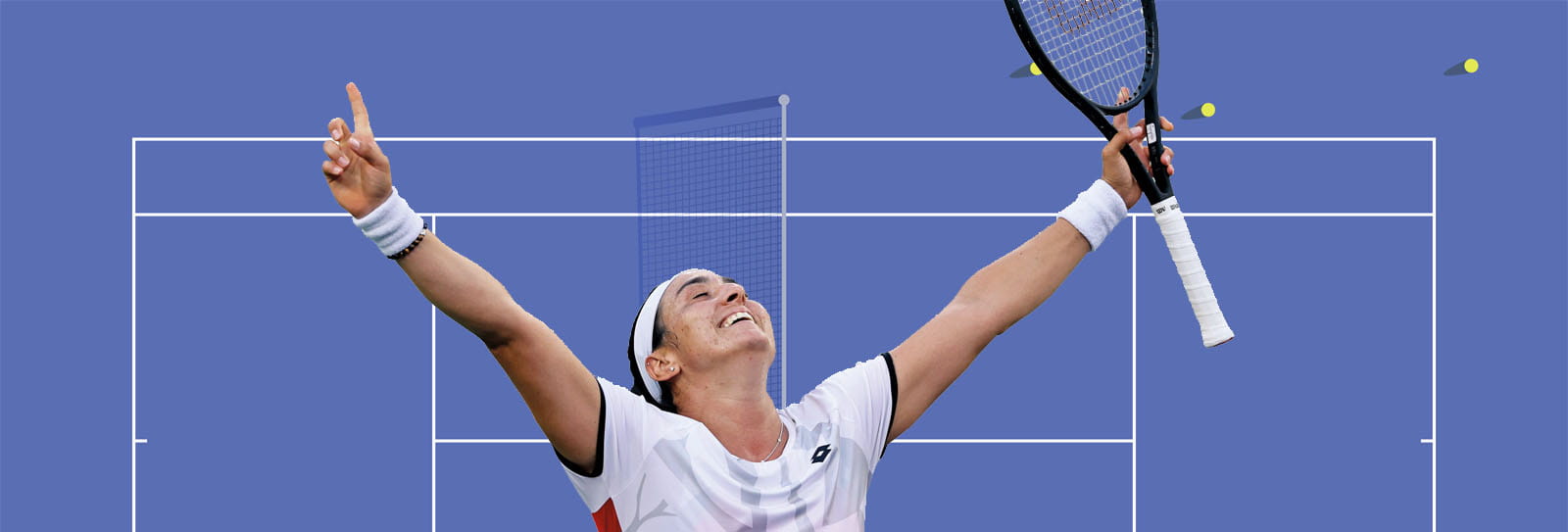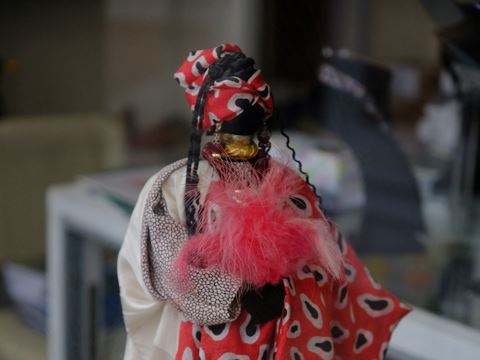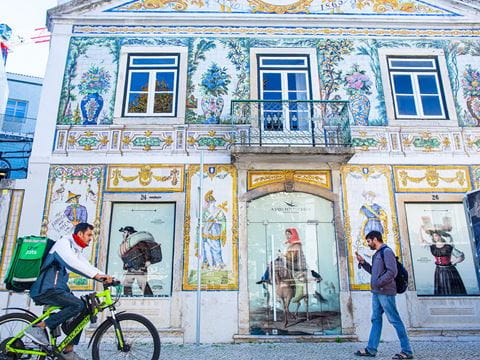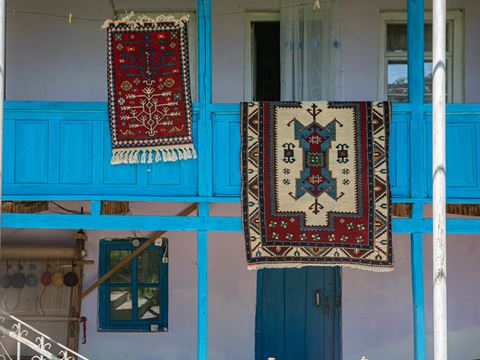
Tunisia's Tennis Player, Ons Jabeur: Being a "First"
Sports
Women Studies
North Africa
Explore what makes a pioneer, what makes success possible and the impact on others.
The following activities and abridged text build off “Ons Jabeur’s Court of No Fear,” written by Brian E. Clark.
WARM UP
Before reading the article or doing the activities, complete this warm-up activity to hypothesize the theme and main idea of the article.
IF YOU ONLY HAVE 15 MINUTES ...
Complete a chart to help you analyze what makes Ons Jabeur a pioneer.
IF YOU ONLY HAVE 30 MINUTES ...
Compare the experiences of Ons Jabeur and another pioneer.
VISUAL ANALYSIS
Analyze the choices made by a photographer and editor about what to record, how to show it and the effect that those choices have on viewers.
Directions: As you read, you will notice certain words are highlighted. See if you can figure out what these words mean based on the context. Then click the word to see if you’re right.
Ons Jabeur's Court of No Fear

Ons Jabeur came to tennis at the tender age of 3 years old. Her mother played tennis at the Tennis Club of Monastir, in Tunisia.While her mother practiced, young Ons would toddle around the courts, playing and picking up stray balls. Fast forward to 2022, when Jabeur was ranked No. 11 in the world by the Women’s Tennis Association (WTA). She says she owes a lot of her success to her mother. “She always wanted to play, and that’s what got me started,” Jabeur said.
France and Spain are known for their tennis champions and prestigious tournaments. Though Tunisia is just across the Mediterranean Sea, tennis wasn’t popular when Jabeur was growing up in the 1990s. At that time, only a few courts existed in mostly touristic cities such as Tunis, Hammamet, and Sousse, Jabeur’s hometown. To play tennis, one had to be dedicated and hardworking. Even today, the game remains a niche sport in Tunisia compared to soccer, volleyball and even handball.
By age 12, Jabeur showed great promise. She traveled 150 kilometers from Sousse to Tunis, the nation’s capital. She trained with top coaches at Tunis’s leading athletic training center, Lycée Sportif El’Menzah. She also trained in France, which has consistently produced some of the world’s highest-ranking tennis professionals.

“I always dreamed I could be one of the best players in the world,” says Jabeur, whose first name means “removal of fear” and “to provide a comforting presence for another” in Arabic.

By age 16, Jabeur was winning tournaments. In 2010 she finished second in the Junior Grand Slam singles at Roland Garros Stadium, in Paris, France. The following year, she returned there to be the first Arab woman to win a junior grand slam singles title.
In June, 2021, at age 26, Jabeur defeated Daria Kasatkina of Russia in the Birmingham Classic in Birmingham, England. This made her the first Arab woman to win a major Women’s Tennis Association title. Jabeur took pride in the win because she had put in five or more hours every day on the court.
“It was a long time coming,” Jabeur says. “I know some people expected me to achieve a WTA title earlier, but injuries held me back.”
Question: 1 a. According to the author, what seems to be the major reason for Ons Jabeur’s success?
[Possible answers may include the following: Hard work and dedication to success.]
Question: 1 b. Why can it be said that Jabeur’s success is especially impressive because she is from Tunisia and not Spain or France?
[Possible answers may include the following: Because tennis is a niche sport in Tunisia, but Spain and France are known for their tennis champions and prestigious tournaments.]
Jabeur’s coach, fellow Tunisian and former tennis pro Issam Jallali, succinctly assessed her long-awaited WTA title: “She’s very gifted and she works hard.”
Her Russian Tunisian husband, Karim Kamoun, a former fencer, coaches her off the court and serves as her personal trainer. Jabeur and Kamoun hope to start a family once she retires. That may not be too far off, as most tennis pros compete until their early 30s. “It all depends on how your body deals with injuries,” Jabeur said. “But if I’m playing well at 34, I’ll be staying on the tour.”
The countries in the Middle East and North Africa have more than 420 million people. Yet they have only produced five top-100 tennis players, including Jabeur. The only other Arab woman to reach a similar level was Selima Sfar, also Tunisian. She ranked 75th in the early 2000s. To date, Jabeur’s highest ranking is No. 7.

“I tell young women, and boys too, that if they train and work hard to be a success, they may achieve their goals,” she says. “And not in just tennis, but in any other sport or activity where you want to prove yourself.”
Though tennis has taken Jabeur all over the world, she has always been most comfortable in Tunisia calling herself a “100 percent Tunisian product.” She wants to use her celebrity to inspire young athletes to excel in life, in whatever path they take.
As Jabeur has gained success in tennis competition, she has also cultivated a strong fan base. They marvel at her “crazy” drop shots and slices that leave her opponents baffled and off balance. Expressing their love for her and patriotism for Tunisia, fans often enthusiastically wave red-and-white Tunisian flags before and after her matches. She has a strong presence on Facebook with multiple fan pages and nearly 1 million followers.
Longtime fan and Tunisia native Hayfa Chine has been following Jabeur’s success for the last eight years. Chine, a tennis player herself, has enjoyed watching Jabeur’s rise.

Chine, who has posed with Jabeur while holding a Tunisian flag at last year’s Chicago Fall Tennis Classic, says each time she’s conversed with her favorite athlete, she finds Jabeur engaging and humble.
“She also has a wonderful personality, and while she is quite focused in her matches, she’s friendly and kind off the court,” Chine says.
In 2021 Jabeur played some of her best tennis going up against top pros, including Spain’s Paula Badosa and Garbiñe Muguruza—both ranked in the Top 10. In the summer of 2021, she defeated US fan-favorite Venus Williams at Wimbledon.
“I am learning every day and working hard every day, too. I want to stay positive and be more successful in all that I do,” she says.
With Jallali by her side, Jabeur has won 11 titles on the International Tennis Federation (ITF) circuit, a steppingstone to the WTA. She has garnered several firsts for the Arab world. She is the first Arab to reach a Grand Slam quarterfinal at the 2020 Australian Open. She is also the first Arab to break into the top 50 in the history of WTA rankings.

Along the way, Jabeur has received praise from childhood idols Andy Roddick and Kim Clijsters, members of the International Tennis Hall of Fame. US tennis icon Billie Jean King has said she wouldn’t be surprised if Jabeur becomes No. 1. “I think she’s got the ability to go much higher.”
Tennis star Serena Williams commended Jabeur for “breaking down barriers” and “inspiring so many people, including me.”
Jabeur hopes to continue increasing her professional ranking in pursuit of her dream of reaching No. 1. But once she’s retired, she plans a quiet life in Tunisia, where she can work with youth, mentor young women and open a tennis academy. There she can nurture a culture of tennis excellence in North Africa and train future tennis champions—so she’s not the only one. “That is my ultimate goal,” she muses.
Question: 2 a. List the four “firsts” that Jabeur has accomplished.
[Possible answers may include the following:
The first Arab woman to win a junior grand slam singles title.
The first Arab woman to win a major Women’s Tennis Association title.
The first Arab to reach a Grand Slam quarterfinal at the 2020 Australian Open.
The first Arab to break into the top 50 in the history of WTA rankings.]
Question: 2 b. Why is being “the first” important in some cases? How might you feel if you were the first in something?
[Answers will vary]
Question: 1 a. According to the author, what seems to be the major reason for Ons Jabeur’s success?
Question: 1 b. Why can it be said that Jabeur’s success is especially impressive because she is from Tunisia and not Spain or France?
Other lessons

The Hill Rice Connection: Trace Its African Diaspora Roots and Examine How Communities Sustain Its Heritage
History
Geography
Anthropology
West Africa
Americas
Explore the connections between rice and African American agricultural history and analyze how hill rice connects to African American agricultural history and examine the Gullah Geechee community’s efforts to preserve this heritage through cultivation and storytelling.
Tracing the History and Geography of Portuguese Tilemaking
Geography
Architecture
Europe
Analyze how culture and technology have changed the ways tiles have been made in Portugal for over 500 years.
The Legacy of Borchalo Rug-Weaving in Georgia: Explore Cultural Change Through Critical Reading and Design
Art
History
Anthropology
The Caucasus
Analyze efforts to preserve a centuries-old weaving tradition, and connect the Borchalo story to questions of identity, memory and heritage.